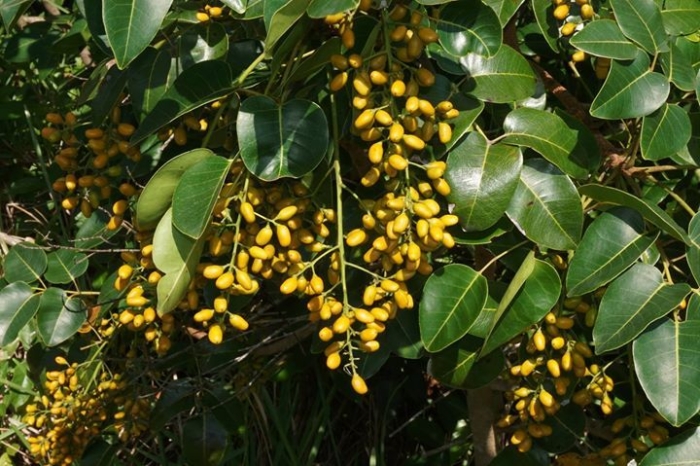Poisonwood
(Metopium toxiferum)
Poisonwood (Metopium toxiferum)
/
/

© Eridan Xharahi
CC BY 4.0
Image By:
© Eridan Xharahi
Recorded By:
Copyright:
CC BY 4.0
Copyright Notice:
Photo by: © Eridan Xharahi | License Type: CC BY 4.0 | License URL: http://creativecommons.org/licenses/by/4.0/ | Uploader: eridanxharahi | Publisher: iNaturalist |













































Estimated Native Range
Summary
Metopium toxiferum, commonly known as poisonwood or Florida poisontree, is a deciduous tree native to tropical hardwood hammocks, pine rocklands, and coastal uplands in the American Neotropics, including South Florida, the Bahamas, the Caribbean, and parts of Central America. It typically grows to a height of 25-35 feet (7.6-10.7 meters) with a similar spread. The tree has a distinctive appearance with dark, reddish-brown bark that peels away to reveal a lighter underbark. Its leaves are compound with glossy leaflets, and it produces small greenish-white flowers followed by yellow-orange drupes that are attractive to birds. Poisonwood is notorious for its sap, which contains urushiol, an irritant that can cause severe dermatitis on contact.
Poisonwood is not commonly cultivated due to its toxic sap, but it is an important species in its native habitat, providing food for wildlife. In the rare instances it is grown, it requires a sunny location with well-drained soil. It is drought-tolerant once established, making it suitable for xeriscaping in tropical climates. Gardeners should exercise caution and wear protective clothing when handling or working near this tree to avoid skin irritation. There are no popular garden cultivars due to its toxic nature.CC BY-SA 4.0
Poisonwood is not commonly cultivated due to its toxic sap, but it is an important species in its native habitat, providing food for wildlife. In the rare instances it is grown, it requires a sunny location with well-drained soil. It is drought-tolerant once established, making it suitable for xeriscaping in tropical climates. Gardeners should exercise caution and wear protective clothing when handling or working near this tree to avoid skin irritation. There are no popular garden cultivars due to its toxic nature.CC BY-SA 4.0
Plant Description
- Plant Type: Tree
- Height: 20-35 feet
- Width: 10-25 feet
- Growth Rate: Moderate
- Flower Color: N/A
- Flowering Season: Winter, Spring, Summer, Fall
- Leaf Retention: Evergreen
Growth Requirements
- Sun: Full Sun
- Water: Very Low, Low
- Drainage: Medium, Fast
Common Uses
Bee Garden, Bird Garden, Butterfly Garden, Deer Resistant
Natural Habitat
Tropical hardwood hammocks, pine rocklands, and coastal uplands
Other Names
Common Names: Florida Poisontree, Hog Gum, Papayo
Scientific Names: , Metopium toxiferum, Metopium linnaei, Amyris toxifera, Rhus oxymetopium, Metopium linnaei var. oxymetopium, Metopium metopium, Pistacia taxiferum, Rhus metopia, Rhus quinquefolia
GBIF Accepted Name: Metopium toxiferum (L.) Krug & Urb.